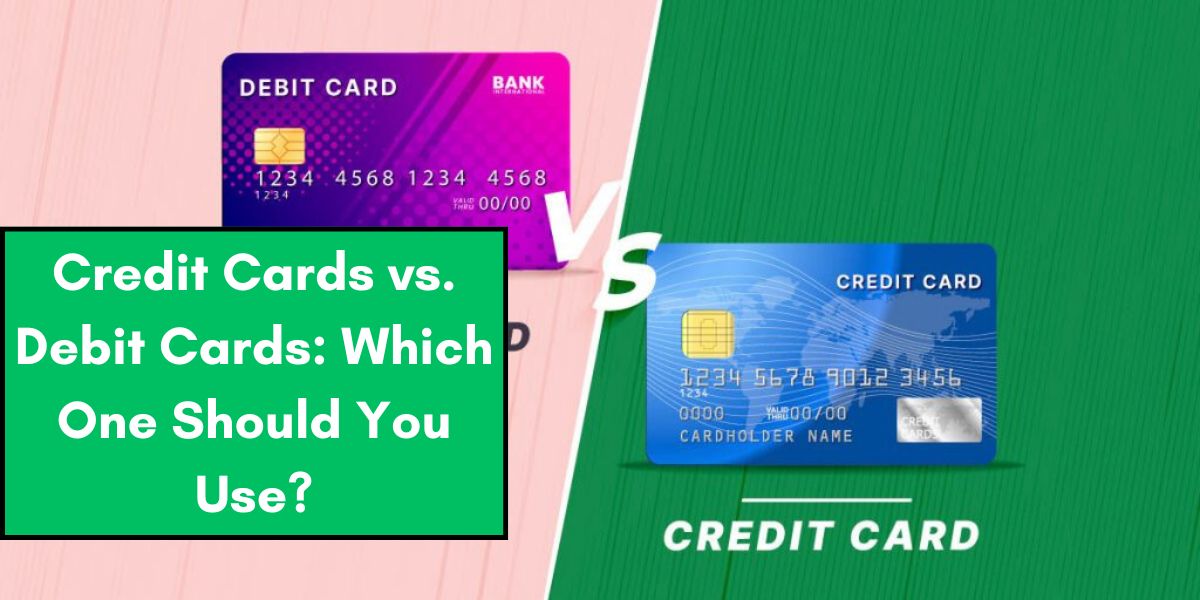Credit cards and debit cards may look the same, but they function very differently. Both have their advantages and drawbacks, depending on your financial habits and needs. So, which one should you use? Let’s break it down.
What’s the Difference Between Credit Cards and Debit Cards?
| Feature | Credit Card | Debit Card |
|---|---|---|
| Source of Funds | Borrowed money (credit line) | Your own money (linked to bank account) |
| Spending Limit | Based on credit limit | Limited to bank account balance |
| Interest Charges | Yes, if balance isn’t paid in full | No interest |
| Fraud Protection | Strong (can dispute fraudulent charges) | Limited (may take longer to recover stolen money) |
| Credit Score Impact | Affects credit score (good for building credit) | Does not impact credit score |
| Rewards & Benefits | Cash back, travel rewards, perks | Usually none |
| Overdraft Fees | No (unless cash advance is used) | Yes, if overdraft protection is enabled |
| Annual Fees | Some cards have fees | Usually none |
Pros and Cons of Credit Cards
Pros:
- Builds Credit Score – Using a credit card responsibly (paying on time and keeping balances low) helps you build credit.
- Fraud Protection – Credit cards offer better fraud protection than debit cards. You can dispute charges and are usually not liable for unauthorized transactions.
- Rewards & Perks – Many credit cards offer cashback, travel points, and perks like extended warranties, rental car insurance, and airport lounge access.
- Emergency Flexibility – A credit card can help in emergencies when you need to cover unexpected expenses.
- Purchase Protection – Some credit cards offer price protection and extended warranties on purchases.
Cons:
- Interest Charges – If you don’t pay your balance in full, you’ll get charged high-interest rates (often 15%-30%).
- Debt Risk – Overspending can lead to debt, making it easy to fall into a debt cycle.
- Fees – Some cards have annual fees, foreign transaction fees, or late payment penalties.
Pros and Cons of Debit Cards
Pros:
- No Debt Risk – Since you’re spending your own money, you won’t rack up debt or pay interest.
- No Interest Charges – Unlike credit cards, you won’t be charged interest on purchases.
- Helps Control Spending – Since you can only spend what’s in your account, it prevents overspending.
- No Credit Check Required – Anyone with a bank account can get a debit card, while credit cards require approval.
Cons:
- Limited Fraud Protection – If your debit card is stolen, it may take longer to get your money back compared to a credit card.
- No Credit Building – Debit card use doesn’t impact your credit score, so it won’t help you build credit.
- Few Perks – Unlike credit cards, most debit cards don’t offer rewards, cash back, or travel benefits.
- Overdraft Fees – If you spend more than your balance and have overdraft protection enabled, you may face steep overdraft fees.
When Should You Use a Credit Card?
Use a credit card if:
- You want to build or improve your credit score.
- You can pay off your balance in full every month to avoid interest.
- You want to earn rewards (cashback, points, or travel miles).
- You need fraud protection for online or high-risk transactions.
- You want extra purchase protection, such as extended warranties or travel insurance.
Best Uses for a Credit Card:
- Large purchases with purchase protection
- Booking hotels, rental cars, or flights
- Earning cash back or travel rewards
- Online shopping for added security
When Should You Use a Debit Card?
Use a debit card if:
- You want to avoid debt and overspending.
- You don’t want to worry about interest charges.
- You need quick access to cash withdrawals without cash advance fees.
- You have a hard time controlling spending with credit cards.
Best Uses for a Debit Card:
- Everyday purchases (groceries, gas, bills)
- Small daily transactions
- ATM withdrawals without extra fees
- Managing money without worrying about debt
Should You Use Both?
Yes! Many people use both credit and debit cards depending on the situation.
- Use a credit card for: large purchases, travel, online shopping, and earning rewards.
- Use a debit card for: everyday spending, ATM withdrawals, and avoiding debt.
If you’re responsible with money, using a credit card for rewards and fraud protection while paying it off in full is the best strategy. However, if you struggle with budgeting or want to avoid debt, sticking with a debit card is a safer option.
Final Verdict: Which One Is Right for You?
| Scenario | Best Choice |
|---|---|
| You want to build credit | Credit Card |
| You want to avoid debt | Debit Card |
| You want cashback or travel rewards | Credit Card |
| You prefer spending only what you have | Debit Card |
| You frequently shop online | Credit Card (better fraud protection) |
| You don’t want to worry about interest | Debit Card |
| You need to rent a car or book a hotel | Credit Card (most places require one) |
| You often withdraw cash from ATMs | Debit Card (to avoid cash advance fees) |
There’s no single right answer—the best choice depends on your spending habits and financial goals.
If you can manage money well, a credit card can help you build credit and earn rewards.
If you want to avoid debt and control spending, a debit card is a safer option.
Ultimately, using both wisely can give you the best of both worlds!

